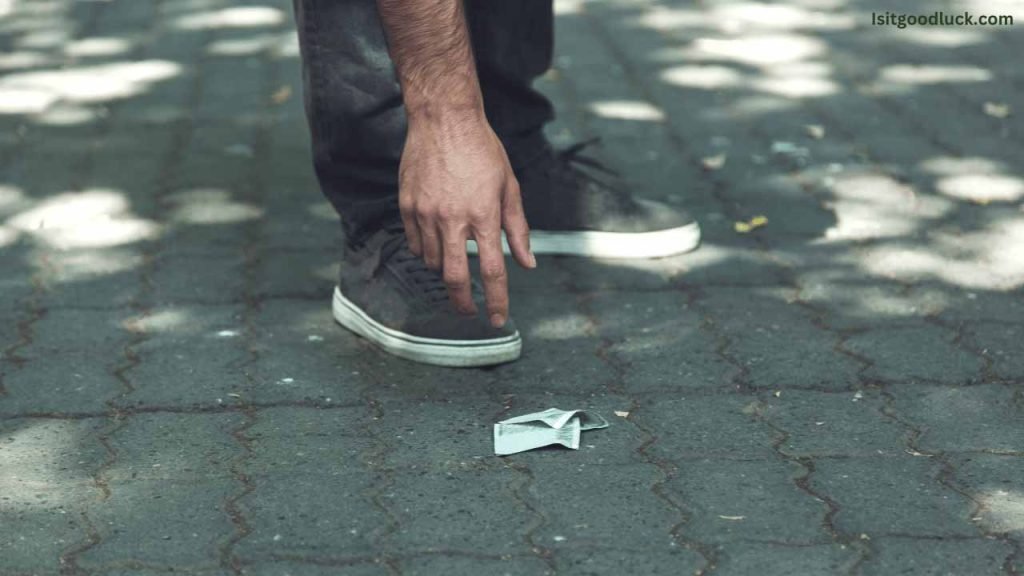In every corner of the globe, superstitions and beliefs surrounding luck and prosperity increase, weaving themselves into the cultural fabric of societies.
One common idea, transcending boundaries of geography and culture, is that finding money on the ground signifies good luck.
Is there any truth in this age-old superstition? If you stumble upon money on this basis, let’s dive deep into the history, interpretations, legal aspects, and responsible steps.
Contents
- 1 Historical Origins of the belief : The Lucky Coin
- 2 Is It Good Luck to Find Money on the Ground?
- 3 What are the Legal Connotations of Found Money?
- 4 Acting Responsibly When Finding Money:
- 5 Conclusion:
- 6 FAQs
- 6.1 Q: Are there specific types of money that are luckier to find than others?
- 6.2 Q: What should I do if someone drops money?
- 6.3 Q: Can I increase my chances of finding money on the ground?
- 6.4 Q: Is any negative superstition associated with finding money on the ground?
- 6.5 Q: Does the belief that finding money brings good luck also apply to digital money?
Historical Origins of the belief : The Lucky Coin
The belief that locating money — mainly coins — augurs well for the finder has roots in ancient times. Money, in the form of coins, was often perceived as a symbol of the gods or divine entities.
The Discovery of a coin was thus interpreted as a blessing from a higher power, an idea perpetuated through religious narratives and myths.
These tales often depicted individuals who happened upon coins and were consequently rewarded with wealth, power, happiness, or a combination thereof.
Over time, this belief diffused into diverse cultures and societies. Europeans embraced the concept that discovering a penny on New Year’s Day ushered in a year of good fortune.
In Japan, stumbling upon a lucky coin was considered a good omen bestowed by the Shinto gods. Hence, over centuries, the tradition of equating found money with good luck seeped into the collective consciousness of multiple cultures.

Is It Good Luck to Find Money on the Ground?
The good luck charm of finding money is a widely accepted belief today, albeit with varying interpretations. For some, this serendipitous event prophesizes imminent wealth. Others perceive it as an indicator of an impending streak of good fortune that may manifest in love, health, or career.
However, a segment of believers adopts a more spiritual interpretation. They view the discovery of money as a message from the universe, signifying abundance and prosperity.
The news might serve as a reminder to cultivate gratitude for existing blessings or signal that divine intervention is about to bestow them with additional boons.
Also read: Is it good luck to find a safety pin?
What are the Legal Connotations of Found Money?
Acknowledging the legal implications of finding money on the ground is crucial. In most jurisdictions, laws mandate that anyone who finds lost property must attempt to locate its rightful owner.
If such efforts prove fruitless, the finder may be allowed to keep the money. In some cases, however, they might have to surrender it to the authorities.
Legal guidelines about found property differ considerably among countries. It’s advisable to familiarize yourself with the local laws in your area to ensure lawful conduct when finding lost or abandoned money.
Acting Responsibly When Finding Money:
Several steps can guide your actions when you find money on the ground. Firstly, try to establish whether the money is lost or abandoned. In case it’s lost, efforts should be made to find the owner, like posting a notice in a local newspaper or on social media platforms.
In instances where the money appears abandoned, you might be entitled to keep it. However, local authorities should be consulted to verify the regulations governing such cases in your area.
Keeping the money obligates you to use it responsibly. Opt for wise spending decisions over squandering it on frivolous items. Consider charitable donations or assisting those in need, thus transforming a personal windfall into communal goodwill.
Conclusion:
The belief that finding money on the ground brings good luck is a widespread notion dating back centuries. Despite varying interpretations, the consensus leans towards positivity.
However, it’s essential to remember the legal and ethical aspects of finding money, ensuring that good fortune does not lead to accidental missteps.
The best response is to balance this serendipitous joy with responsible actions, embodying the belief that luck favors the reliable.
Also read other articles regarding finding objects good luck
FAQs
Q: Are there specific types of money that are luckier to find than others?
A: This largely depends on cultural beliefs and personal interpretations. In some cultures, finding coins, mainly pennies is seen as a sign of good luck. However, this doesn’t mean that finding larger denominations of currency can’t also be seen as a sign of good fortune. Ultimately, luck is highly subjective and can vary significantly from person to person.
Q: What should I do if someone drops money?
A: Ethically speaking, if you see someone drop money, the right thing to do is to pick it up and return it to them. While some might consider keeping it as their good luck, it’s important to remember that the money was not lost or abandoned but accidentally dropped by the rightful owner. Therefore, returning the money would be considered a good deed, and who knows, that good deed could bring you good luck in return!
Q: Can I increase my chances of finding money on the ground?
A: There is no surefire way to increase your chances of finding money on the ground, as it is typically a random occurrence. However, being observant and mindful of your surroundings can help you notice when money has been dropped or lost.
Q: Is any negative superstition associated with finding money on the ground?
A: Generally, finding money is seen as a positive event. However, in some cultures, there are superstitions about how money is found that could be seen as unfavorable. For example, some people believe that if you find money and don’t pick it up, it could mean that you’re rejecting the good luck that the universe is trying to give you. But again, this varies considerably based on personal and cultural beliefs.
Q: Does the belief that finding money brings good luck also apply to digital money?
A: The superstition originally refers to physical money, as the concept predates digital currencies. However, some people may also extend this belief to unexpected digital windfalls, like finding unclaimed money in an old online account or receiving a surprise refund or bonus. Like all beliefs around luck and fortune, this can be highly subjective and dependent on personal interpretations.








